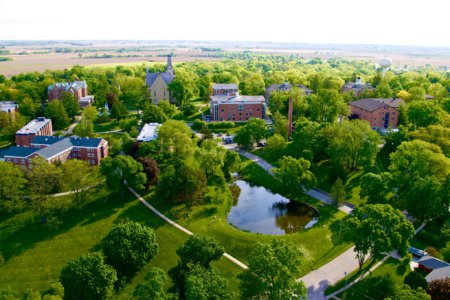
In a heavily-digitised world, STEM degrees have been held in high regard, topping several lists of the world’s best majors. However, an education in liberal arts can lead to some pretty outstanding outcomes. Just ask some of the world’s most successful business leaders.
Howard Schultz, Starbucks CEO, studied communications. Carly Fiorina, former Hewlett-Packard CEO, studied medieval history and philosophy. Susan Wojcicki, YouTube CEO, studied history and literature. Jack Ma, Alibaba chairman, studied English.
History, and the Fortune 500 list, prove that those who choose this path develop into critical thinkers, effective communicators, global citizens and ultimately, impactful individuals. Furthermore, the concept behind liberal arts is robust. Universities encompassing this theme explore all aspects of humanities. From philosophy, languages, ethics and social sciences to natural sciences such as biology and chemistry, and formal sciences such as advanced mathematics — it’s clear a liberal arts education is comprehensive, and anything but focused on a singular field.
For students looking to expand their horizons with a liberal arts education, there’s no study abroad destination better than Europe. Historic architecture, poetic languages, delectable cuisines — the list is as long and impressive as the continent’s history. Another notable perk? A well-respected higher education system. There are hundreds of universities to choose from, and tens of thousands of programmes taught in English. If you wish to immerse yourself in European culture while acquiring an all-American liberal arts education, these universities in Europe are top picks:
The American University of Paris
Located in what many would describe as the cultural capital of the world. Over 110 nationalities represented, with 65 languages spoken. 16 student mobility partnerships. Since its beginnings, which dates back to 1962, the American University of Paris (AUP) has always been a cut above the rest. Over 1,200 students are enrolled into this world-renowned institution which offers an American education in one of the world’s most cosmopolitan and photogenic cities. Here, within walking distance of the Arc de Triomphe and Champs-Élysées, students live the Parisian dream while immersing themselves in an environment and programmes that nurture them into responsible actors in communities, civil societies, and countries around the world.
AUP President Dr. Celeste M. Schenck sums it up best, “AUP is a true 21st-century world university with an incomparable urban location in the most beautiful city in the world, and a curriculum designed to produce global leaders by focusing on the comparative and the cross-cultural, the international and the interdisciplinary.”
Its prestige is proven with recognition. AUP has been continuously accredited by the Middle States Commission on Higher Education (MSCHE) since 1973. A contributing factor? High-quality academics. AUP’s faculty of 35 nationalities harness the power of research and practice to spark thought-provoking debates, in true liberal arts fashion, in small, collaborative classroom settings. Here, students develop language, writing, public speaking, quantitative and technological skills as part of the AUP Global Liberal Arts Core Curriculum.
What’s more, students are encouraged to experiment and have a go at any discipline that intrigues them, from human rights law to French Renaissance and artificial intelligence. The goal is to develop well-rounded graduates ready for further study and professional endeavours in any part of the world. Over 20,000 alumni, currently living and working in 145 countries, are testament to AUP’s success. Learn more here.
Amsterdam University College
Over 800 students — half from abroad — are proud to live and learn in a diverse and eclectic campus located at Amsterdam Science Park. Here, studies are based on the American liberal arts and sciences model, taught entirely in English. Every year, 300 students arrive to nab a degree uniquely issued by two of Amsterdam’s most prestigious research institutions — University of Amsterdam (UvA) and Vrije Universiteit (VU) Amsterdam. This partnership ensures students will have easy access to services and facilities offered by not just one, but three institutions.
Amsterdam University College (AUC)’s study programme is structured around three years, covering six semesters. Study plans are customisable, allowing students to tailor their curriculums with a mix of core subjects and a variety of electives.
The AUC Academic Core courses provide the right foundation. Courses include foreign language, a Big Questions course, logic, information and argumentation, academic writing, advanced research writing and the Global Identity Experience. These key subjects are rounded out with majors in the sciences, social sciences or humanities. Additionally, there are several electives to choose from. To conclude their studies, students apply their knowledge with a capstone experience.
Bard College Berlin
At Bard College Berlin, a German-American accredited university, 254 students, representing 60 nationalities, partake in an intensive, transdisciplinary liberal arts education in the humanities and social sciences.
Collaboration and engagement are highly-encouraged. To achieve this, programmes are facilitated in small classrooms. With individualised attention, comes personalised curriculums. Students here are given the opportunity to pursue rigorous, wide-ranging courses in intellectual history that serve as an indispensable groundwork for pursuits in any discipline. They will also be able to choose from a vast lineup of electives including philosophy, literature, film, art history, and social and economic theory.
A key benefit? Location. This highly-international and diverse campus is situated in the political, economic and artistic centrer of Europe, meaning Bard students receive direct exposure through seminars and activities rooted in the city. Through internships, students can gain work experience in several fields, such as the arts, human rights, publishing, urban planning, technology start-ups, or education.
John Cabot University
Founded in 1972, John Cabot University (JCU) is an American liberal arts university located in the heart of Rome. The university is licensed by the Department of Education of the State of Delaware, accredited by the Middle States Commission on Higher Education, and authorised by the Government of Italy to operate as an American four-year university in Rome.
The university’s long lineup of liberal arts majors include classical studies, history, humanistic studies, art history, English literature and Italian studies. For students looking for more practical skills, alternative majors include business administration, marketing, international affairs, economics, political science and communications. JCU professors come from impressive backgrounds, well-equipped to deliver these teachings. They hold qualifications from prestigious institutions such as Brown University, Columbia University, Harvard University, Johns Hopkins University, the University of Cambridge, the University of Oxford and Yale.
There’s no better place to get the best of both worlds. Students here enjoy all the outstanding qualities the US university system has to offer, while exploring the culturally-rich, historic city of Rome. Its location provides ideal surroundings for JCU students, who come from 70 countries, to study architecture, art, art history, archaeology, history and religion at countless museums and historic sites.














